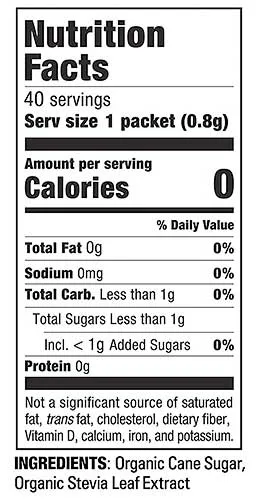A few months ago I was doing some light research for an article about the dangers of erythritol, a common sugar substitute that is in wide use and commonly mixed with other sugar substitutes like stevia and monk fruit. The article discussed a recent study that found notable dangers in erythritol centered around blood clotting. Not good.
As a diabetic, I have to pay close attention to sugars and I avoid them as a matter of course and was doing a good job—I thought. I don’t eat sugary snacks. I treat dessert at a restaurant with my wife and friends as a spectator sport. And I use stevia in my morning coffee. Well, for a period of a year and a half I thought I was using stevia.
As I was writing the article about erythritol. I looked up a bunch of stevia-based products on Amazon to see if they also contained the erythritol sweetener ingredient. Many did. Then I decided to check my personal stock of stevia sweetener. Instant, though temporary, relief. No erythritol. However, the primary ingredient in my “stevia” sweetener turned out to be organic cane sugar!
I bought a product called Organic Stevia in the Raw at CostCo. “Hey, come to Papa!” I thought when I spotted it there in warehouse-sized packages. 800 packets! It was going to last me years. I was a proud shopper—but now I was a forehead-slapping sucker.
It says right on the front of the box, “organic stevia and organic cane sugar,” albeit in much smaller lettering. A bit concerning once you spot it—if you spot it. Then it says “Organic Stevia Blend.” Like that means something. With the largest lettering dedicated to “Organic Stevia in the Raw” you think instantly that you’re getting just stevia.
When you finally look at the legally mandated ingredient label, there it is. Glaring reality. The first ingredient is not stevia at all, but rather the organic cane sugar. That translates to the final fact that these are sugar packs with stevia added. The perfect thing for a diabetic to take with morning coffee and then wonder why their medication to bring down A1C has ceased working—and the A1C readings were going back up!
A1C is a measure of your average blood sugar for a three-month period, one of the commonly-used tests to diagnose prediabetes and diabetes. Mine was going down from when I was first diagnosed a few years ago, using a medication that targets it directly. Then it stopped going down. Then it started going back up. Then it was higher than the original reading years back.
Once I discovered the blatant packing lies by the marketers of “Organic Stevia in the Raw” I tossed out their product (preserving a few for lab testing and possible legal action or at least regulatory agitation) and switched back to the original stevia product I was using. A later blood test showed my A1C already coming back down.
This site has published a lot of information over the past couple of years about companies marketing products to consumers while caring little or nothing about being honest with their customers. But boy do they care about their bottom lines and their bonuses. A little lie here or there, who cares? Well in this case, probably the estimated 37 million people with diabetes in the U.S. alone might have an opinion or two.
Organic Stevia in the Raw is a product of a company called Cumberland Packing Corporation. Exploring the products on their website is an eye-opening experience. One of the products they are famous (or infamous) for is Sweet and Low, the little packets of saccharine found in almost every restaurant or Starbucks or any other place where sugar substitutes are offered. They also make a monk fruit product which lists erythritol as the first ingredient. Ironically, Organic Stevia in the Raw includes the marketing statement on Amazon that is has no erythritol.
But Wait, There’s More
I started digging a bit further after I originally published an earlier version of this piece.
The website for this product contains this little gem on their FAQ page:
In Organic Stevia In The Raw®, we chose to blend our Organic Stevia with Organic Cane Sugar to create the perfect balance of sweetness and a delicious taste, at only 3 calories per packet, which the FDA considers dietetically zero.
I saw this and started wondering what 3 calories of organic cane sugar weighed. According to the Nutritionix Food Database, 1 teaspoon of organic cane sugar weighs in at 8 grams and equates to 30 calories.
So, by simple arithmetic we arrive at the fact that 3 grams of organic cane sugar weighs .8 grams. I refer you now to the ingredient label above and to the serving size of these “stevia” packets. That’s right. They weigh .8 grams.
So the real question that has to be asked is “Where is the stevia part of this blend hiding?” Was a stevia leaf taped next to the conveyor belt transporting the sugar to the packaging machines?
To call this blatant false advertising would be correct. But it is more on the level of the scammers who sold mineral supplements that were literally dirt in capsules.
But for diabetics, this scam by Cumberland Packing Company should be compared more closely to the MMS scam of the Grenon brothers of the fake Genesis II church, recently sentenced to prison.
The moral of this tale is that to be responsible for our own health and we must read labels thoroughly and develop a deep and uncompromising distrust of marketing statements from companies. While there are truth-in-advertising laws, companies like Cumberland Packing play around the margins of those laws. Their packaging does reveal that sugar is in the product. But that fact is de-emphasized by the design—a clearly intentional action—thus placing the onus on the consumer to observe past their lies. Ironically they even give a clue as to how big their lie is on their website.
I would be shocked if I was the only person who took Cumberland’s little revelation of “3 calories” and pulled the string to see what that really means. If this resonates with any readers, please reach out.

Marty Kassowitz
Marty Kassowitz is co-founder of Factkeepers. As founder of Interest Factory and View360, he brings more than 30 years experience in effective online communications, social media management, and platform development to the site. He is a writer, designer, editor and long time observer of the ill-logic demonstrated by too many members of the species known as Mankind. After a long history of somewhat private commentary on a subject he totally hates: politics, Marty was encouraged to build this site and put up his own analyses as well as curate relevant content from other sources.

